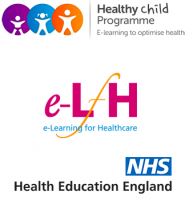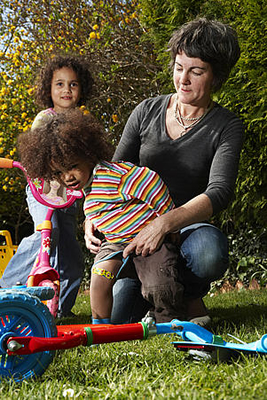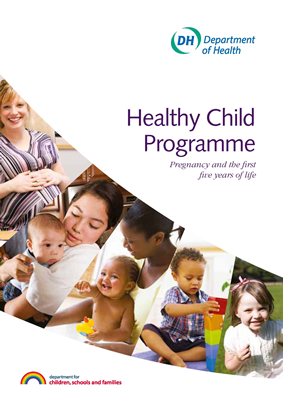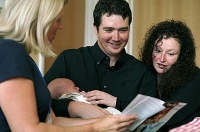Healthy Child Programme Model of Practice for Health Visitors course for Paediatricians



This session forms the first stage of providing the health visitor profession with a model of practice that you and families can use to guide your work together on the Healthy Child Programme. It will help you to structure and reflect upon your use of the HCP with families. The model of practice will also help to explain your work to other professionals, services and commissioners.
This session covers the universal aspects of the HCP and does not look at practice with families with complex needs where the process of helping people to change is more intensive. This model of practice was co-produced with health visitors and is derived from the Family Partnership Model (Day et al, 2015) and experience of FNP.
Learning objectives
By the end of this session you will be able to:
- Explain how the five components of this model of practice for health visitors apply to your Healthy Child Programme work
- Identify the connections between this model and the science and craft of health visitor practice
- Identify three aspects of your current practice that are consistent with or challenged by this model of practice
- Identify three ways in which this model could extend your practice in delivering the Healthy Child Programme
This session aims to help you to understand and reflect on a proposed model of practice to underpin the HCP. You may find it helpful to work through it with others in your HCP or HV team.
Before commencing this session you should complete the following HCP session
- Healthy Child Programme Basics/Introduction to the Healthy Child Programme (402-0001)
Dr Crispin Day trained as a clinical psychologist after having worked for a range of health, social care and voluntary agencies. He has since worked as a clinician, manager and researcher in adult and then child mental health. He led the development and evaluation of children and young people’s preventative and community mental health services, which were recommended as UK national models of good practice by the Audit Commission and Mental Health Foundation.
Crispin now heads the Centre for Parent and Child Support which is the main international research, development and dissemination unit for the Family Partnership Model (Davis & Day, 2009ab; 2010). He has published and lectured widely as well as provided advice to central and local government in the UK, Australia and New Zealand. He was a member of the CAMHS Review (2009) and is currently an expert contributor to the Department of Health’s Pregnancy, Birth and Beyond and the Family Nurse Partnership, National Unit at the Department of Health. As part of this work, Crispin has been working with Ann Rowe on the development of a health visitor model of practice for the Healthy Child Programme.
Crispin heads the CAMHS HSR Unit, King’s College, Institute of Psychiatry which conducts research into the outcomes and dissemination of evidence based parenting and CBT interventions, increasing access to mental health care for Black, Minority and socially excluded communities, and the effects of children’s service priorities on service quality and outcomes. Crispin has just completed a randomised control trial of a new community intervention in which parents in socially disadvantaged areas are trained to run parenting programmes for other local parents. He is also currently leading research to develop and test an innovative manualised approach to meet the needs of primary school aged children with severe anti-social behaviour and at risk of school exclusion as well as a community-based peer-led parenting intervention


Ann Rowe [BA (Hons), M MedSci, RGN, RHV] is the National Implementation Lead for the Family Nurse Partnership Programme within Department of Health. Following a career in nursing, health visiting, specialist project work with young parents and practice development roles, Ann worked as a research and development consultant at the University of Sheffield and as a nurse advisor to the DH.
Within her career, Ann has worked with a number of organisations, from PHCTs & PCTs to SHAs and national agencies, in a variety of capacities. Her work has included leading learning programmes, undertaking evaluative studies, facilitating groups and teams, designing and running change programmes and acting as an external consultant.
Within her current role, Ann leads the training, programme adaptation and implementation of the Family Nurse Partnership (FNP) programme in England.
- Health Promotion: Breastfeeding course for Paediat...
- Posted By eIntegrity Healthcare e-Learning
- Posted Date: 2025-01-30
- Location:Online
- This session aims to enhance the learner’s knowledge of how to promote breastfeeding by exploring fa...
- Screening Programmes Part 2: Antenatal and Newborn...
- Posted By eIntegrity Healthcare e-Learning
- Posted Date: 2025-01-30
- Location:Online
- This session describes and discusses the NHS Fetal Anomaly Screening Programme, the NHS Newborn and ...
- Substance Misuse During Pregnancy course for Paedi...
- Posted By eIntegrity Healthcare e-Learning
- Posted Date: 2025-01-30
- Location:Online
- This session aims to raise awareness regarding the impact of substance misuse during pregnancy and i...
- Ensuring Quality: Role of the UK NSC, Policy Devel...
- Posted By eIntegrity Healthcare e-Learning
- Posted Date: 2025-01-30
- Location:Online
- This sessions offers you an understanding of how screening programmes are chosen and how their quali...
- Overview and Principles of Screening course for Pa...
- Posted By eIntegrity Healthcare e-Learning
- Posted Date: 2025-01-30
- Location:Online
- This session provides an overview of the principles and practice of screening, clarifying relevant t...








